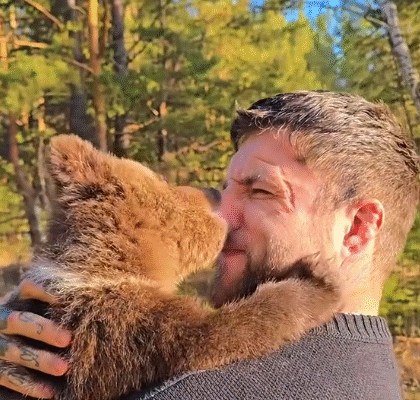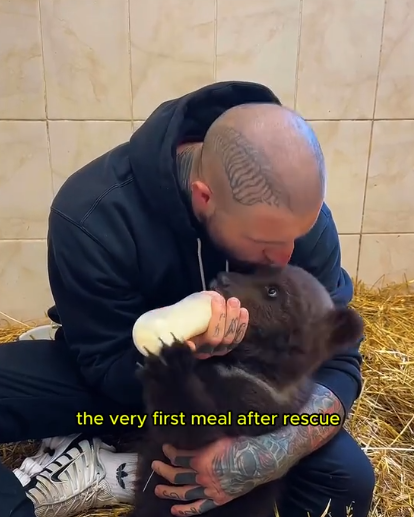
Deep in the heart of the forest, where the trees stood tall like silent guardians and the air was heavy with the scent of pine, something stirred. A small, lonely bear cub, barely the size of a Labrador, wandered alone along the edge of a mountain trail. His fur was matted, his belly sunken, and his dark eyes looked around with a mix of fear and hope. He was too young to be on his own.
Mila, a forest ranger in her late twenties, was making her usual morning rounds along the trail when she noticed fresh paw prints in the mud. She knelt down, inspecting them. “That’s odd,” she muttered. “Too small for a grown bear. But no other tracks around it…”
Curious and concerned, she followed the paw prints for half a mile until she saw him—curled up under a low-hanging branch, shivering from the cold. The moment their eyes met, Mila felt a deep pang in her chest. He didn’t growl or run. He just looked at her with those big eyes full of loneliness.
“Hey there, little guy,” she said softly, crouching down a few feet away. “Where’s your mama?”
He whimpered.
Mila’s training had prepared her for many things, but not for this—an abandoned or orphaned cub was rare, and protocol demanded she report it and wait for wildlife authorities. But something told her this cub didn’t have much time. He was too small to hunt, too weak to climb trees, and utterly alone.
She radioed her supervisor, explained the situation, and got reluctant approval to take the cub in temporarily until wildlife services could arrive. Wrapping him in her thick jacket, she carried him back to her ranger cabin nestled at the edge of the forest. He didn’t resist. He just pressed his nose into her chest, seeking warmth.
She named him “Misho,” which meant “little bear” in an old Slavic dialect her grandmother once spoke.
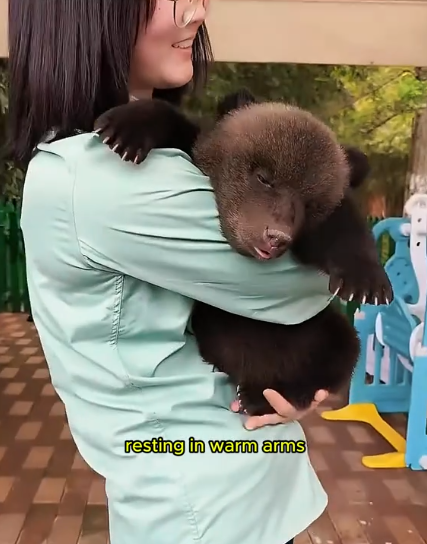
In the beginning, it was challenging. Misho wouldn’t eat. He would cry softly at night, waking Mila from her sleep. She’d sit beside him, whispering softly, gently stroking his fur until he calmed down. She fed him goat’s milk through a bottle, adding in mashed berries and oats when he began showing signs of strength.
Her small cabin, once quiet and orderly, was now a whirlwind of blankets, chewed shoes, and overturned bowls. Yet, it never felt more alive.
Days turned into weeks, and Misho began to grow. His fur became glossier, his eyes brighter. He followed Mila everywhere—tripping over his own paws, climbing over her boots, even trying to mimic her when she did stretches in the morning.
The bond they formed was unbreakable. Misho would nuzzle her face whenever she returned from her ranger duties, and she’d laugh as he clumsily tried to play hide-and-seek behind trees far too narrow to hide his growing frame.
But deep inside, Mila knew this couldn’t last forever.
Wild animals, no matter how tame they seem, don’t belong in houses or cabins. Misho needed to learn how to live in the wild again. Wildlife services had contacted her multiple times about relocating him to a rehabilitation center. She delayed, arguing he was still too young. But eventually, they gave her a deadline.
“You did an incredible job,” her supervisor told her. “But we have to think long-term. He needs to be reintroduced to his natural habitat.”
The day before the wildlife transport team was set to arrive, Mila took Misho for a long walk in the woods. They visited the stream he loved to splash in, the tree stump he used as a lookout post, and the patch of grass where he once napped under the sun.
She sat down, and he curled beside her.
“You’re going to do great out there,” she whispered, stroking his head. “You’ll meet other bears, maybe even find your own family. You won’t be alone anymore.”
Misho looked up at her, almost understanding. He licked her cheek.
The next morning was the hardest of Mila’s life.
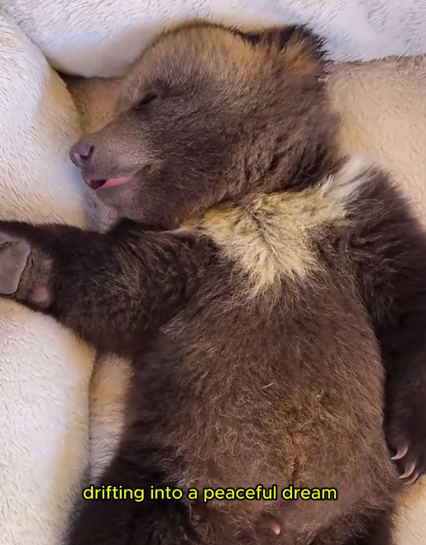
The transport team came with a secure carrier and gentle gloves. Mila helped coax Misho in with pieces of apple and soft words. He didn’t fight it—maybe he sensed this goodbye was part of his journey.
As the vehicle drove away, Mila stood still, tears streaming down her cheeks. Her cabin felt unbearably quiet that night.
Weeks passed.
She received occasional updates from the wildlife center—Misho was adjusting well, learning to forage and interact with other young bears. They planned to release him into a protected part of the forest come spring.
Mila would often walk the same trail where she first found him, thinking of his first scared little whimper, of the nights she cradled him by the fireplace.
Then, one sunny afternoon several months later, something incredible happened.
While walking near the stream, she heard a familiar sound—low, playful grunts. Her heart skipped a beat. She turned toward the sound and saw him—bigger, stronger, but unmistakably Misho. He stood on his hind legs briefly, sniffing the air. Then, with surprising gentleness for a bear his size, he bounded toward her.
Mila froze, unsure if she was dreaming. Misho stopped a few feet away, then let out a soft, rolling growl—the sound he always made when asking for a belly rub.
Tears welled in her eyes as she reached out. He rubbed his head against her hip, then backed away, as if to say: “I’m okay now.”
They sat by the stream for a while—no longer a ranger and her cub, but two souls forever connected.
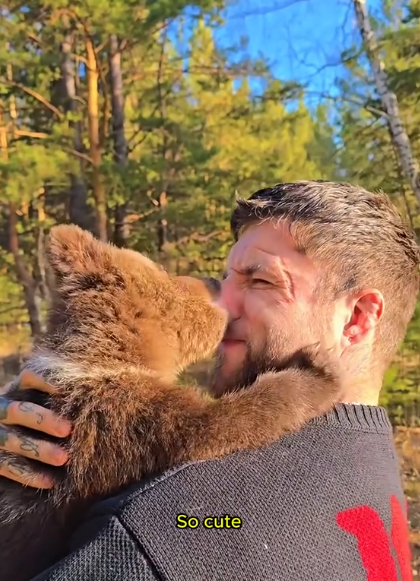
Eventually, Misho turned and walked back into the forest. He didn’t look back, and he didn’t need to. Mila knew he was home. And somehow, that made her feel at home, too.
Adopting a lonely bear cub had changed her life forever. It taught her the beauty of trust, the power of compassion, and the bittersweet strength of letting go.
